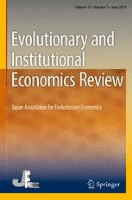
Evolutionary and Institutional Economics Review
Scope & Guideline
Enhancing Discourse in Evolutionary Economics
Introduction
Aims and Scopes
- Evolutionary Economics:
The journal explores evolutionary economics as a dynamic approach to understanding economic processes, emphasizing innovation, adaptation, and the role of institutions in shaping economic outcomes. - Institutional Analysis:
It focuses on the role of institutions—formal and informal rules, norms, and organizations—in economic development, policy-making, and the behavior of economic agents. - Interdisciplinary Perspectives:
The journal encourages contributions that draw from various disciplines including sociology, history, and political science, to enrich economic analysis and understand complex economic phenomena. - Empirical Research and Methodologies:
It publishes empirical studies that apply various quantitative and qualitative methods to analyze economic issues, particularly in the context of institutional frameworks and evolutionary dynamics. - Policy Implications:
The journal aims to inform policymakers by examining the implications of evolutionary and institutional economics for economic policy, particularly in areas like governance, sustainability, and economic crises.
Trending and Emerging
- Sustainability and Governance:
There is an increasing focus on the intersection of economic practices with environmental and social governance, particularly in how firms adapt to sustainability challenges and the implications for economic policy. - Microfoundations of Economic Behavior:
Emerging scholarship is increasingly investigating the microfoundations of economic behavior, linking individual actions and institutional contexts to broader economic outcomes, highlighting the importance of understanding underlying motivations and mechanisms. - Digital Economy and Financial Innovation:
The journal has seen a rise in topics related to the digital economy, including the impact of blockchain technology and digital currencies, reflecting the ongoing transformation of financial systems and economic interactions. - Economic Resilience and Crisis Response:
Post-pandemic analyses focusing on economic resilience, recovery strategies, and the role of institutions in navigating crises have become prominent, showcasing the journal's commitment to addressing timely issues. - Interdisciplinary Approaches to Economic Problems:
An emerging trend is the integration of insights from various disciplines, such as psychology and sociology, into economic analysis, encouraging a more holistic understanding of economic phenomena.
Declining or Waning
- Classical Economic Theories:
There has been a noticeable decline in discussions centered around classical economic theories, such as the IS-LM model and traditional production functions, indicating a shift towards more contemporary approaches that integrate evolutionary and institutional insights. - Static Equilibrium Models:
The focus on static models and equilibrium analysis has waned, as the journal increasingly emphasizes dynamic processes and the complexities of economic systems rather than simplified equilibrium states. - Single-Dimensional Economic Analysis:
There appears to be a decreasing emphasis on analyses that consider economics in isolation from social, environmental, and political factors, as the journal expands its lens to include multi-dimensional and interdisciplinary approaches. - Historical Economic Perspectives:
While historical analysis remains relevant, the frequency of papers solely focused on historical economic perspectives without linking them to contemporary issues has diminished, suggesting a preference for forward-looking analyses.
Similar Journals
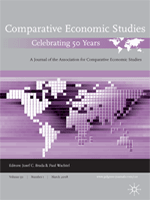
Comparative Economic Studies
Advancing the Frontiers of Economic InsightComparative Economic Studies is a prominent academic journal dedicated to the field of economics, published by Palgrave Macmillan Ltd. Now in its converged years from 1996 to 2024, this journal provides a robust platform for innovative research and critical analysis within the economics and econometrics arenas. With an ISSN of 0888-7233 and an E-ISSN of 1478-3320, it has established itself as a vital resource for scholars and practitioners interested in comparative economic analysis, policy evaluation, and theoretical advancements. Recognized for its quality, the journal is classified in the Q3 category in 2023, reflecting its solid standing within the field, with a Scopus rank of 390 out of 716 journals in economics and econometrics. Although it currently does not offer open-access options, the journal is committed to disseminating significant findings that influence policy and scholarship globally. Its well-curated articles play an essential role in shaping contemporary economic discourse, making it an indispensable resource for researchers, professionals, and students alike.

Scientific Annals of Economics and Business
Exploring Innovative Ideas in Economic ResearchScientific Annals of Economics and Business, published by the esteemed ALEXANDRU IOAN CUZA UNIVERSITY OF IASI FACULTY OF ECONOMICS AND BUSINESS ADMINISTRATION, is a prominent open-access journal that has been serving the academic community since 2016. With its ISSN 2501-1960 and E-ISSN 2501-3165, this journal focuses on the interdisciplinary fields of economics, business management, and related areas, promoting the dissemination of impactful research and innovative ideas within these sectors. Notably, it has secured a Q3 ranking in both Business, Management and Accounting, as well as in Economics, Econometrics and Finance, as of 2023, highlighting its commitment to maintaining scholarly excellence. Situated in Romania, the journal aims to bridge the gap between academia and practice, providing an invaluable platform for researchers, professionals, and students who seek to contribute to and stay informed about emerging trends and developments in economics and business. With its dynamic outreach and commitment to quality, the Scientific Annals of Economics and Business is an essential resource for anyone looking to enhance their understanding and expertise in these critical fields.

Economics of Transition and Institutional Change
Unraveling the complexities of transition economies and institutional change.Economics of Transition and Institutional Change is a dynamic academic journal published by WILEY, dedicated to exploring the intricate relationship between economic transitions and institutional modifications across diverse global contexts. Established in 2019, the journal aims to illuminate the mechanisms through which institutional change influences economic performance, particularly in transitional economies. With its ISSN 2577-6975 and E-ISSN 2577-6983, the journal provides a platform for researchers and economists to disseminate high-quality, peer-reviewed research that reflects contemporary issues in the field. Given its classification in the Q3 and Q2 quartiles for 2023 in both Economics and Econometrics, and broader categories involving Finance, it occupies a vital role within its academic niche, ensuring your work gains the attention it deserves. The journal offers open access options, making valuable research freely available to a wider audience, thereby enhancing its impact. Located in Hoboken, New Jersey, Economics of Transition and Institutional Change invites contributions that investigate theoretical and practical perspectives, ensuring a rich dialogue among scholars, practitioners, and policymakers.
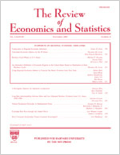
REVIEW OF ECONOMICS AND STATISTICS
Elevating research standards in economic studies.REVIEW OF ECONOMICS AND STATISTICS, published by MIT PRESS, stands as a pivotal journal in the fields of economics and econometrics, with origins dating back to 1978. As a high-impact publication with impressive 2023 rankings placing it in the Q1 category for both Economics and Econometrics, and Social Sciences (miscellaneous), it serves as a crucial platform for scholarly discourse. With an E-ISSN of 1530-9142, the journal provides vital insights and analyses that drive contemporary understanding of economic phenomena. Recognized for its rigorous peer-review process and influential research, the REVIEW OF ECONOMICS AND STATISTICS is essential for researchers, professionals, and students aiming to advance their knowledge and contribute to the field. Though it does not currently offer open access, its substantial impact factor and cutting-edge studies ensure that its articles remain indispensable resources for anyone dedicated to the advancement of economic research.

B E Journal of Economic Analysis & Policy
Connecting Theory and Practice in Economic PolicyB E Journal of Economic Analysis & Policy, published by Walter de Gruyter GmbH in Germany, stands as a pivotal resource in the field of economics and econometrics since its establishment in 2001. Boasting an ISSN of 2194-6108 and an E-ISSN of 1935-1682, this journal is committed to advancing the understanding of economic policies and their analysis through rigorous, peer-reviewed research. With an impressive categorization that includes a Q2 ranking in the Economics, Econometrics and Finance (miscellaneous) category and a Q3 ranking in other economics niches as of 2023, it emphasizes the importance of empirical research and robust theoretical frameworks. The journal is indexed in Scopus, reaffirming its credibility, with ranks in the 49th and 32nd percentiles for its respective categories. Researchers, professionals, and students alike will find valuable insights and innovative perspectives within its pages, as it continues to shape discussions around economic policy in an ever-evolving global landscape.

Economics of Governance
Driving Innovation in the Economics of Governance.Economics of Governance (ISSN: 1435-6104; E-ISSN: 1435-8131) is a distinguished journal published by SPRINGER HEIDELBERG, dedicated to advancing the field of governance economics. Established in 2003, this journal explores the intricate relationships between governance structures and economic performance, making it a vital resource for researchers, practitioners, and policymakers alike. With its impressive categorization in Q3 in Business and International Management and Q2 in Economics, Econometrics, and Finance (miscellaneous) as of 2023, it stands as a prominent platform for innovative research. Although it operates without open access, it attracts a robust readership owing to its critical analyses and high-quality contributions, fostering an understanding of governance mechanisms in a globalized economy. The journal also receives recognition within Scopus, ranking #139 in General Economics and #323 in Business and International Management, reflecting its influence in shaping current discourse and research trends. For those devoted to the economics of governance, this journal is a crucial asset that continually encourages scholarly inquiry and professional development.

JOURNAL OF EVOLUTIONARY ECONOMICS
Advancing knowledge at the intersection of economics and evolution.JOURNAL OF EVOLUTIONARY ECONOMICS, published by SPRINGER, serves as a critical platform for the dissemination of innovative research in the dynamic field of evolutionary economics. With an ISSN of 0936-9937 and an E-ISSN of 1432-1386, this journal has been at the forefront of exploring the intricate relationships between economic systems and evolutionary theory since its inception in 1991. As of 2023, it proudly holds a Q2 ranking in both the Business, Management and Accounting (miscellaneous) and Economics and Econometrics categories, illustrating its significant contribution to these domains. With a Scopus ranking of #260/716 in Economics and Econometrics and #93/218 in General Business, Management and Accounting, JOURNAL OF EVOLUTIONARY ECONOMICS is essential for researchers, professionals, and students keen on understanding the complex interplay of economic evolution and innovation. Although it does not offer Open Access options, its robust impact in shaping economic discourse makes it a vital resource for advancing knowledge and scholarship.
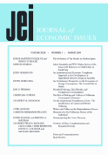
JOURNAL OF ECONOMIC ISSUES
Illuminating the path to understanding economic phenomena.JOURNAL OF ECONOMIC ISSUES, published by Routledge Journals, Taylor & Francis Ltd, is a vital resource in the field of economics and related social sciences. With its ISSN 0021-3624 and E-ISSN 1946-326X, this esteemed journal brings a critical focus on contemporary economic discussions, analyses, and research findings since its inception in 1982. The journal has been consistently recognized for its scholarly contributions, noted for a 2023 categorization of Q2 in Business, Management, and Accounting (miscellaneous) and Q3 in Economics and Econometrics, highlighting its relevance within these disciplines. Although not an open-access journal, the value of its exclusive content is immense for researchers, professionals, and students seeking in-depth knowledge and insights on economic issues. The editorial board is dedicated to advancing understanding in various economic arenas, inviting contributions that challenge conventional wisdom and foster deeper inquiries into economic phenomena. The journal's location in the United Kingdom, at 2-4 Park Square, Milton Park, Abingdon, reflects its commitment to international discourse in economic studies. As we navigate an increasingly complex global economy, the JOURNAL OF ECONOMIC ISSUES remains an essential platform for sharing innovative ideas and research that drive the economics field forward.
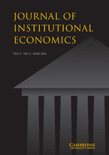
Journal of Institutional Economics
Exploring the Nexus of Economics and GovernanceJournal of Institutional Economics, published by Cambridge University Press, stands as a premier forum for the dissemination of research at the intersection of economics, institutions, and governance. With an ISSN of 1744-1374 and E-ISSN 1744-1382, this journal has established itself as a vital resource within the academic community, achieving an impressive Q1 ranking in the field of Economics, Econometrics and Finance as of 2023. The journal's focus on institutional analysis not only enhances our understanding of economic phenomena but also fosters interdisciplinary dialogue among scholars and practitioners alike. With a commendable rank of 39 out of 288 in Scopus rankings, placing it in the 86th percentile, the Journal of Institutional Economics provides access to groundbreaking research that holds significant implications for policy and decision-making. Researchers, professionals, and students engaged in the study of economic systems will find this journal an invaluable addition to their academic resources.
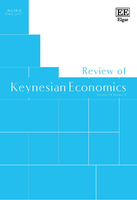
Review of Keynesian Economics
Bridging Theory and Practice in Keynesian EconomicsReview of Keynesian Economics, published by Edward Elgar Publishing Ltd, stands as a pivotal platform for scholarly discourse within the Economics and Econometrics field. With its ISSN 2049-5323 and E-ISSN 2049-5331, the journal has cultivated a robust reputation since its inception in 2012, recently earning recognition as a Q2 journal in its 2023 category rankings. The journal aims to delve into contemporary issues through the lens of Keynesian theory, fostering innovative research and critical analysis that challenges prevailing economic paradigms. Although the journal features no open access options, its rich repository of peer-reviewed articles provides invaluable insights for researchers, professionals, and students alike, making it a staple resource for those keen on exploring the evolving landscape of economic thought. With a Scopus rank of 300/716 in the realm of Economics, this journal occupies a notable position, reflecting its continued relevance and impact within the academic community.